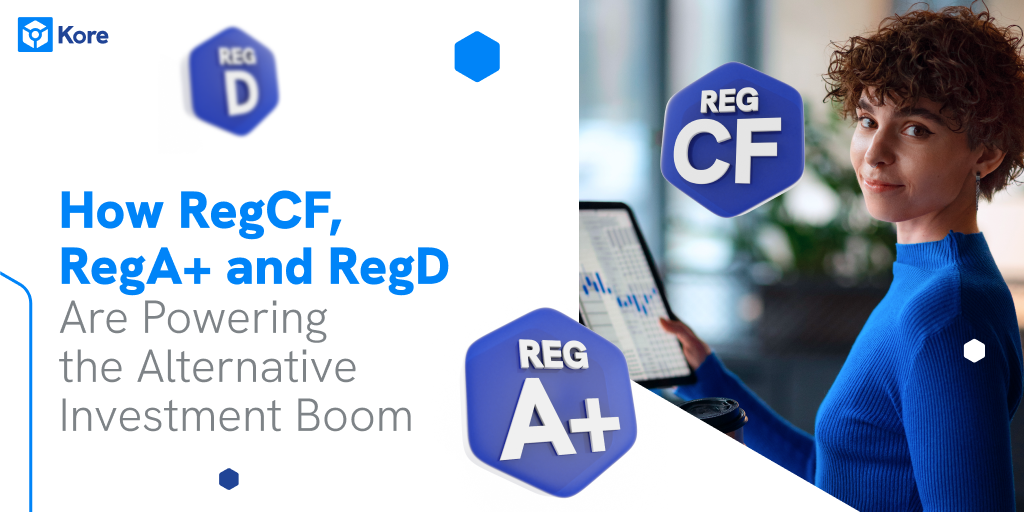How Regulation CF (RegCF), RegA+, and RegD Are Powering the Alternative Investment Boom

By Oscar A. Jofre
Over the past decade, we have witnessed a fundamental transformation in the private capital markets, driven by regulatory changes introduced through the JOBS Act. This has resulted in a booming alternative investment market that provides more opportunities for companies and investors alike. In less than five years, over $150 billion has been raised using these exemptions. RegCF, RegA+, and RegD are now the fastest-growing capital-raising exemptions in the United States, unlocking capital that was once inaccessible to many businesses.
For FINRA Broker-Dealers, FINRA ATS operators, Compliance Officers, and other regulated FINRA Intermediaries, understanding these exemptions is critical to ensuring compliance and maximizing opportunities in this expanding market.
The Rise of “Alts” – The Future of Private Market Investing
These regulations have now become defined as the “Alts”—the alternative investments that investors across all categories, from retail to institutional, are increasingly seeking to participate in.
Historically, alternative investments such as venture capital, private equity, and hedge funds were reserved for accredited investors and institutions. However, RegCF, RegA+, and RegD have broken down these barriers, enabling all investor types to engage in private market opportunities. This shift represents one of the most significant changes in investment history, democratizing access to high-growth, early-stage, and pre-IPO companies.
The growing appetite for “Alts” can be attributed to several key factors:
- Expanded Access – Non-accredited investors can now invest in private companies through RegCF and RegA+, providing them with opportunities that were once out of reach.
- Portfolio Diversification – Investors are increasingly looking beyond traditional stocks and bonds, recognizing that private markets offer potential for higher returns and unique investment opportunities.
- Liquidity and Secondary Trading – With the rise of Alternative Trading Systems (ATS), investors can now buy and sell private securities, creating new exit strategies and enhancing the appeal of alternative investments.
The Alts revolution is here, and it is being driven by the regulatory framework established under the JOBS Act. As more investors shift their focus toward these alternative investment vehicles, we expect to see continued growth in private market participation and capital formation.
The JOBS Act and the Birth of a New Capital Market
The Jumpstart Our Business Startups (JOBS) Act was signed into law in 2012 with the goal of modernizing capital-raising frameworks and democratizing access to investment opportunities. Prior to its implementation, private investments were largely restricted to accredited investors—those with high net worth or income thresholds. The JOBS Act introduced several exemptions, including RegCF, RegA+, and RegD, that reshaped capital formation.
How Much Has Been Raised with JOBS Act Regulations?
The impact of these regulations has been enormous. According to industry reports, capital raised under these exemptions includes:
- $1.8 billion raised via RegA+ (July 2021 – June 2022)
- $506.7 million raised via RegCF
- $2.3 trillion through RegD 506(b)
- $148 trillion through RegD 506(c)
These numbers illustrate just how transformative these regulations have been. They provide alternative capital-raising paths that are compliant, efficient, and accessible to a much broader audience of investors.
RegCF: Crowdfunding for Private Companies
Regulation Crowdfunding (RegCF) has been a game-changer for early-stage startups and small businesses. Initially capped at $1 million, the SEC increased the fundraising limit to $5 million, significantly enhancing its viability for seed and Series A rounds.
Why is RegCF Growing So Quickly?
- Access to Non-Accredited Investors – Unlike RegD, which limits participation to accredited investors, RegCF allows anyone to invest. This dramatically expands the investor base from just 8.5 million accredited investors to over 233 million non-accredited investors.
- Streamlined Compliance – Companies can raise capital online through FINRA-regulated funding portals, simplifying the investment process.
- Digital Securities and Secondary Trading – Many issuers are now integrating digital securities into their RegCF offerings, improving transparency and liquidity.
As RegCF continues to gain traction, we expect it to surpass $5 billion in total raises in the coming years.
RegA+: The IPO Alternative
Regulation A+ (RegA+) allows private companies to raise up to $75 million annually from both accredited and non-accredited investors. It is often referred to as a mini-IPO because it provides a pathway to public market-style capital raising without the burden of a full IPO process.
Why Issuers Choose RegA+
- Higher Capital Limits – The increase from $50 million to $75 million has made RegA+ more attractive.
- Lower Compliance Burden than an IPO – While companies must file an SEC Form 1-A, they avoid the more stringent requirements of a full public offering.
- Liquidity and Secondary Market Trading – Companies that raise capital through RegA+ can facilitate trading on alternative trading systems (ATS), allowing investors to buy and sell shares post-offering.
RegA+ has become a preferred route for private companies looking to scale significantly while remaining compliant.
RegD: The Institutional Capital Engine
While RegCF and RegA+ have opened doors for retail investors, Regulation D (RegD) remains the powerhouse for institutional capital raises.
Under RegD 506(b) and 506(c), companies can raise an unlimited amount of capital from accredited investors. In total, more than $150 trillion has been raised through RegD offerings.
Final Thoughts: The Future of “Alts” and Private Capital Markets
The JOBS Act regulations—RegCF, RegA+, and RegD—have fundamentally reshaped private capital formation, unlocking new pathways for companies and investors alike. In less than five years, these exemptions have powered over $150 billion in capital raises, demonstrating their lasting impact.
Now, these regulations have defined what investors broadly recognize as “Alts”—the new frontier of alternative investments. Whether retail investors seeking portfolio diversification, accredited investors looking for high-growth opportunities, or institutions pursuing liquidity in private markets, RegCF, RegA+, and RegD have cemented their place as the most sought-after investment vehicles.
For FINRA Broker-Dealers, ATS operators, Compliance Officers, and other regulated intermediaries, the opportunities within these regulations are vast, but compliance remains paramount. The future of private capital markets is digital, compliant, and more accessible than ever before.
As the leader in the private capital markets, I encourage stakeholders to stay ahead of regulatory changes, leverage technology, and embrace the evolution of capital formation.





